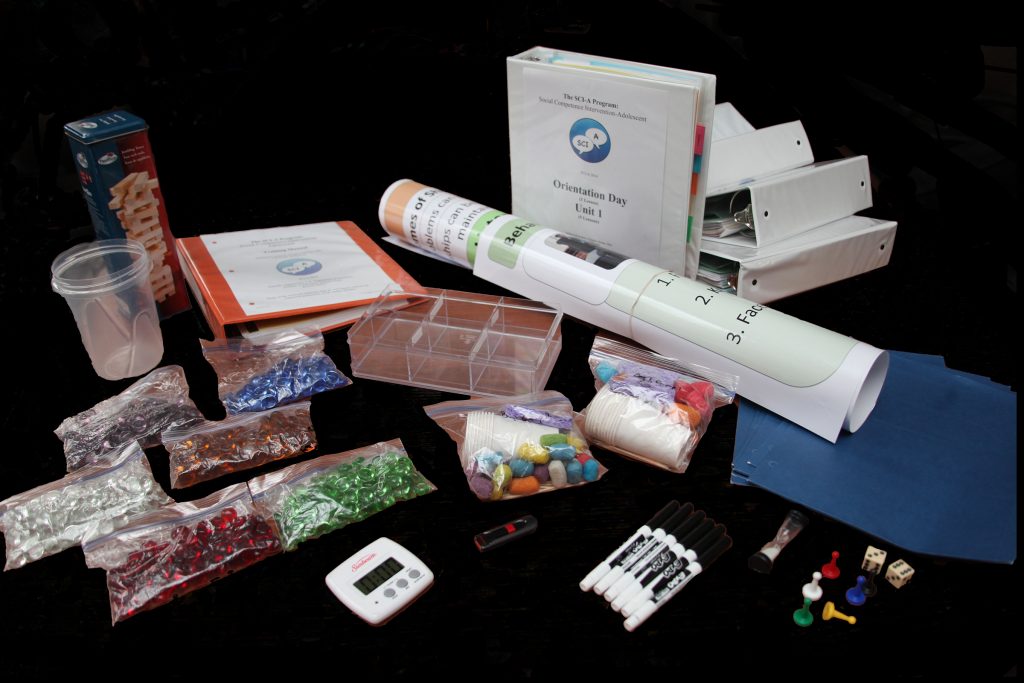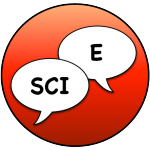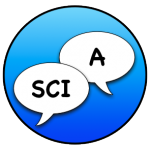From The Center for Social and Behavioral Competence
Enhance the social skills of K-12 youth.

SCI is a social competence intervention that combines both cognitive-behavioral and applied behavior analysis principles within a group-based application. The intervention is specifically designed to enhance the social competence needs of youth and adolescents with higher functioning Autism and those with similar social skill deficits. There are three separate curricula designed to cover K-12.
View a video about the program here
To date, the SCI suite of curricula has been delivered to across the country to more than 500 youth, across 61 schools and clinical centers by 71 school-based educators.
To purchase the curricula, click here or email: info@isocl.net.

- SCI is designed as a wrap-around model to promote the development, maintenance and generalization of social skills and prosocial interactions through three primary components
- Classroom – 20 hours of group-based lessons over an academic semester
- School-wide – Concurrent system of training, communication of curricular concepts, and strategies across educational personnel to support the generalization of social skills across academic environments
- Home and Community – Concurrent system of communication of curricular concepts and strategies for the family in order to support the generalization of social skills to home and community environments
SCI for Elementary
- Home and Community – Concurrent system of communication of curricular concepts and strategies for the family in order to support the generalization of social skills to home and community environments
- School-wide – Concurrent system of training, communication of curricular concepts, and strategies across educational personnel to support the generalization of social skills across academic environments
- Classroom – 20 hours of group-based lessons over an academic semester
- SCI-E is designed for children, aged 6-10 with higher functioning Autism and those with similar social skill deficits. It is a wrap-around model to promote the development, maintenance and generalization of social skills and prosocial interactions through three primary components

SCI-Elementary (children, aged 6-10) - The curriculum is designed to provide direct instruction, modeling, supported practice, and naturalistic practice to maximize student learning and to assist in skill acquisition and maintenance. Across five units, lessons and materials are systematically sequenced to scaffold the students’ learning. The lesson plans and materials are easily accessible and laid out for each lesson
- Each lesson provides an opportunity for group-based learning with interactive opportunities to practice new skills, including:
- Recognizing Facial Expressions
- Sharing Ideas
- Turn Taking in Conversation
- Understanding Feelings & Emotions
- Problem Solving
To purchase the curricula, click here.
Included Materials:
- 5 Unit Binders and corresponding lesson plans and materials
- 1 Training Manual
- 6 student folders
- 1 large Curricular Tub to hold all the materials
- 9 curricular posters and 2 blank poster board
- 1 Marble Organizer
- 1 Marble Container
- 6 bags of marbles (70 marbles in each)1 SCI-E Flash Drive with saved materials
- 7 dry erase markers
- 1 digital timer
- 1 Mirror
- 1 Tallest Tower Activity Kit
SCI for Adolescents
- SCI-A is designed for adolescents, aged 11-14 with higher functioning Autism and those with similar social skill deficits. It is a wrap-around model to promote the development, maintenance and generalization of social skills and prosocial interactions through three primary components
- Classroom – 20 hours of group-based lessons over an academic semester

SCI-Adolescent (adolescents, aged 11-14) - School-wide – Concurrent system of training, communication of curricular concepts, and strategies across educational personnel to support the generalization of social skills across academic environments
- Home and Community – Concurrent system of communication of curricular concepts and strategies for the family in order to support the generalization of social skills to home and community environments
- The curriculum is designed to provide direct instruction, modeling, supported practice, and naturalistic practice to maximize student learning and to assist in skill acquisition and maintenance. Across five units, lessons and materials are systematically sequenced to scaffold the students’ learning. The lesson plans and materials are easily accessible and laid out for each lesson
- Each lesson provides an opportunity for group-based learning with interactive opportunities to practice new skills, including:
- Recognizing Facial Expressions
- Sharing Ideas
- Turn Taking in Conversation
- Understanding Feelings & Emotions
- Problem Solving
To purchase the curricula, click here.
Included Materials:
- 5 Unit Binders and corresponding lesson plans and materials
- 1 Training Manual
- 6 student folders
- 1 large Curricular Tub to hold all the materials
- 7 curricular posters and 2 blank poster board
- 1 Marble Organizer
- 1 Marble Container
- 6 bags of marbles (70 marbles in each)
- 1 SCI-A Flash Drive with saved materials
- 7 dry erase markers
- 1 digital timer
- 1 game piece bag (pawns, dice, sand timer)
- 1 Jumbling Tower Game
- 1 Tallest Tower Activity Kit
SCI for High School
- SCI is designed for teens, aged 14-18 with higher functioning Autism and those with similar social skill deficits. It is a wrap-around model to promote the development, maintenance and generalization of social skills and prosocial interactions through three primary components

SCI-Adolescent (teens, ages 11-14) - Classroom – 20 hours of group-based lessons over an academic semester
- School-wide – Concurrent system of training, communication of curricular concepts, and strategies across educational personnel to support the generalization of social skills across academic environments
- Home and Community – Concurrent system of communication of curricular concepts and strategies for the family in order to support the generalization of social skills to home and community environments
- The curriculum is designed to provide direct instruction, modeling, supported practice, and naturalistic practice to maximize student learning and to assist in skill acquisition and maintenance. Across five units, lessons and materials are systematically sequenced to scaffold the students’ learning. The lesson plans and materials are easily accessible and laid out for each lesson
- Each lesson provides an opportunity for group-based learning with interactive opportunities to practice new skills, including:
- Communicating Ideas
- Conversation and Collaboration
- Perspective Taking
- Problem Solving
- Interactions and Applications
To purchase the curricula, click here or email: info@isocl.net.
Included Materials:
- 5 Unit Binders and corresponding lesson plans and materials
- 1 Training Manual
- 6 student folders
- 1 large Curricular Tub to hold all the materials
- 1 SCI-A Flash Drive with saved materials
- 7 dry erase markers
- 1 digital timer
- 1 game piece bag (pawns, dice, sand timer)
- 1 Jumbling Tower Game
- 1 Tallest Tower Activity Kit
Parent Resources
Coming soon!
The Team
Dr. Janine Stichter is a Professor in the Department of Special Education and has worked with schools and students with autism and behavioral needs for over 25 years. Dr. Stichter presents nationally and conducts research in the following areas: Implementation science, social competence and the antecedent strategies. She has published over 80 peer-reviewed articles, provided over 120 national and international presentations and has received over $12 Million in federal grants including the Institute of Educational Sciences and National Institute of Health as Principal Investigator and Co-Investigator. Mizzou Advantage profile of Janine Stichter.
Jaclyn Benigno is a Research Associate in the Department of Special Education at MU. She is a Site Facilitator for the CSBC Center and focuses on training and technical support for implementers using the Social Competence Intervention curriculum. She has her masters in Special Education with an Emphasis in Autism.
Research
Stichter J.P., Christ, S.E., Herzog, M.J., O’Donnell, R., & O’Connor, K.V. (2016). Exploring the use of multiple measures of executive functioning within a Social Competence Intervention (SCI). Assessment for Effective Intervention, 41, 243-254. doi:10.1177/1534508416644179
Stichter, J.P., Herzog, M.J., Owens, S.A., & Malugen, E. (2016). Manualization, feasibility, and effectiveness of the school-based Social Competence Intervention for Adolescents (SCI-A). Psychology in the Schools, 53, 583-600. doi:10.1002/pits.21928
Stichter, J.P., Herzog, M., Kilgus, S., & Schoemann, A., (in press) Exploring the moderating effects of cognitive abilities on social competence intervention outcomes. Behavior Modification.
Stichter, J.P., Riley-Tillman, T.C., & Jimmerson, S. (in press). Assessing, understanding, and supporting students with autism at school: Contemporary science, practice, and policy. School Psychology Quarterly.
Kilgus, S ., Riley-Tillman, T.C., Stichter, J.P., Schoemann, A.M., & Bellesheim, K. (2015). Reliability of Direct Behavior Ratings-Social Competence (DBR-SC) data: How many ratings are necessary? School Psychology Quarterly. doi.org/10.1037/spq0000128
Schmidt, C. & Stichter, J.P. (2012). The use of peer-mediated interventions to promote the generalization of social competence for adolescents with high-functioning autism and Asperger’s Syndrome. Exceptionality, 20, 94-113.
Schultz, T.R., Stichter, J. P., Herzog, M.J., McGhee, S.D., & Lierheimer, K. (2012). Social Competence Intervention for Parents (SCI-P): Comparing outcomes for a parent education program targeting adolescents with ASD. Autism Research and Treatment vol. 2012, Article ID 681465, 10 pages. doi:10.1155/2012/681465
Stichter, J.P., O’Connor, K.V., Herzog, M.J., Lierheimer, K., & McGhee, S.D. (2012). Social Competence Intervention for Elementary students with Aspergers Syndrome and high functioning autism, Journal of Autism and Developmental Disorders, 42, 354-366. DOI: 10.1007/s10803-011-1249-2.
Schmidt, C., Stichter, J. P., Lierheimer, K., McGhee, S., & O’Connor, K. V. (2011). An initial investigation of the generalization of a school-based social competence intervention for youth with high-functioning autism. Autism Research & Treatment, 1-11. doi:10.1155/2011/589539
Stichter, J.P., Herzog, M.J., Visovsky, K., Schmidt, C., Randolph, J., Schultz, T. & Gage, N. (2010). Social competence intervention for youth with Asperger Syndrome and high-functioning autism: An initial investigation. Journal of Autism and Developmental Disorders 40, (9),1067-1079.